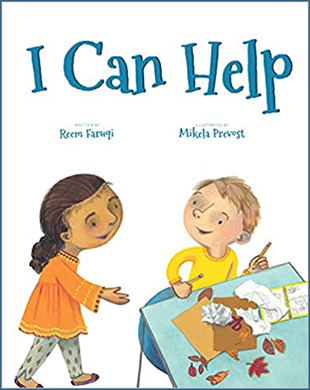Almost all of us make a serious mess of things at some point in our lives, failing to listen to our own wisdom. We don't always get a chance to repair the damage directly. What do we do then? I Can Help explores how good intentions can get derailed and gives an example of how to find our way back to essential spiritual practices like kindness.
The narrator, Zahra, appreciates her classmate Kyle, who's good at drawing and drumming but has trouble with reading, handwriting, cutting, and gluing. So she's delighted when her teacher chooses her to help Kyle.
But while swinging during recess, she overhears other kids in the class saying that Kyle is "such a baby" and "looks weird." She has her back to the bullies, but illustrator Mikela Prevost does not spare us from the spiteful expressions on their faces. One of them later asks Zahra why she helps Kyle, and she doesn't know what to say.
It's heartbreaking the next day when the teacher asks Zahra to help cut paper for Kyle. Zahra shouts "Do it yourself!" at him, observing that "I don't recognize my voice." She never gets another chance to help him and wonders whether he knows that she still wants to help. Yet when he says to her, "You're mean now," she only replies, "So?" We see the conflict raging in her, and the part that makes her look down at her schoolwork and not at Kyle wins.
When fall comes around again, Zahra starts at a new school. It's only then that she finds a way to make reparations, not with Kyle himself but with a child who "looks a little like Kyle."
Author Reem Faruqi writes in her Author's Note that she got teased in school, too, for helping someone. She regrets that she then became mean to him and that, when she was ready to apologize, "it was too late because I had moved away to a different school in a different continent." She resolved to be kinder, and she "remembered how it felt to hurt someone, and I didn't want to be that person any more." Her firsthand example speaks powerfully to children ages six to eight who face dilemmas of conscience akin to the one she experienced.
The Illustrator's Note adds a further dimension by describing how Mikela Prevost had physical limitations that made her different from others. She, too, will inspire children by noting that "I will be forever grateful to those that risked looking 'weird' by showing me kindness."
